- Home
- Steven Harper
The Havoc Machine ce-4
The Havoc Machine ce-4 Read online
The Havoc Machine
( Clockwork Empire - 4 )
Steven Harper
Steven Harper
The Havoc Machine
THE STORY SO FAR
We find ourselves rather chagrined.
Once that most amazing of volumes The Dragon Men went to press, we were quite positive there were no more stories to tell about the Clockwork Empire. Our entire staff prepared to go on holiday, content in the knowledge of a job well done. However, just as our dear secretary Mrs. Wentworth was shutting off the gas and picking up her hatbox, a package arrived that proved our assessment was…erroneous. Fallacious. False. It seems that an entirely new set of thrilling adventures was happening right under our very noses during that time when Gavin Ennock and Alice, Lady Michaels were dealing with a giant squid in the Caspian Sea. Therefore, with a breathless excitement and a certain delighted embarrassment, we bring forth The Havoc Machine.
To our established readers, we offer a warm greeting and a joyful handshake at your return. If you feel quite comfortable with your memory of previous events, you are encouraged to thumb your way over to the first chapter, in which a beautiful woman makes one Thaddeus Sharpe a mysterious and intriguing offer. But if you need a refresher, or if the library in your cranial implant is still malfunctioning, you may find the following information of use.
To our new readers, we offer a hearty welcome. If you have not perused the previous astonishing volumes in the Clockwork Empire (specifically The Doomsday Vault, The Impossible Cube, and The Dragon Men), fear not! This fourth volume provides the perfect entry portal. To be honest, readers hungry for adventure may skip over all the dry exposition that follows here and begin straightaway with chapter one (though we humbly point out that an even more fascinating method for acquainting oneself with the Clockwork Empire is to purchase copies of the three thrilling novels that make up the first part of the story, if one is so inclined, and we thank such readers for their kind patronage).
Finally, established readers may also note that Gavin and Alice, our protagonists from the first three books, seem to be entirely absent. We do hope that no one takes serious umbrage or fishes about for expired fruit to throw. Alice and Gavin’s story comes to a tidy, if suspenseful, close at the end of The Dragon Men, and it would hardly be fair to rake everything up again, though a tiny bit of paper clipped to the last page of this latest manuscript advises us that Alice and Gavin did not live out their final years in quiet desperation, so we may yet hear more of them. In any case, we daresay that our highly intelligent and discerning readers will find Thaddeus Sharpe and his strange companion Dante compelling in their own right. Additionally, Mr. Sharpe is quite handsome.
Perhaps that will make up for Mrs. Wentworth’s canceled holiday.
The year is 1860.
A little more than a hundred years ago, a dreadful plague swept across continents and entrenched itself on the planet. The plague causes rotting of the flesh, and also invades the host’s nervous system, creating motor dysfunction, dementia, and photosensitivity. Victims lurching through the late stages were inevitably dubbed plague zombies, and they spread the disease farther with every pitiful step. However, a handful of victims end up with neural synapses that, for a brief time, draw together instead of falling apart. Advanced mathematics, physics, biology, and chemistry become simple playthings to them. But as they think and invent like mad, the virus slowly devours their brains, and they lose their grip on reality. Their attachment to mechanical inventions and their detachment from normal human emotion earned them the name clockwork geniuses or clockworkers, and the disease itself became the clockwork plague.
Different parts of the world react to clockworkers in different ways. China venerates clockworkers and grants them status nearly equal to the emperor himself. England fears them, and created a police force known as the Third Ward, which hunted clockworkers down, locked them in secret laboratories, and stashed a number of their more dangerous inventions in the Doomsday Vault. These two mighty nations-England and China-built opposing empires using fantastic inventions supplied by captive clockworkers, and only a delicate balance of power held the two empires in check.
Into the middle of all this came the Ukrainian Empire. In that thrilling adventure known as The Impossible Cube, readers learned that the clockwork plague actually originated in Ukraine in 1750, smack in the middle of a time when that country was occupied by both Poland and Russia.
It also created a number of Ukrainian clockworkers. Cossack clockworkers.
These mad geniuses swiftly created powerful engines of war that dispersed their Polish and Russian occupiers with all speed and greatly expanded the Ukrainian borders to boot. Unfortunately, these Cossack clockworkers turned out to be despots nearly as bad as the Poles and Russians, and they ruled their own people with a brass fist.
That is, until Gavin Ennock and Alice, Lady Michaels joined the circus.
Through a complicated and heart-stopping series of adventures also detailed in The Impossible Cube (a fascinating book that the editors highly recommend for all gift-giving occasions), Gavin and Alice arrived in Kiev with the Kalakos Circus of Automatons and Other Wonders. They were intending only to pass through on their way to Peking for reasons of their own, but the Gonta-Zalizniak “family” of clockworkers attempted to meddle in this couple’s affairs, and to their surprise, were thoroughly crushed for their efforts. They should have known better, of course-Alice had personally destroyed the British Empire by releasing a cure for the clockwork plague and ensuring that England would have no more clockworkers or clockwork inventions. Wiping out a few troublesome Cossacks barely gave her pause.
Unfortunately, during this process, the Gonta-Zalizniaks attacked the Kalakos Circus, and many of the performers were scattered. The dam that famously generated electricity for Kiev was also destroyed, threatening thousands of lives, and Gavin only barely managed to get everyone aboard the circus train and rush them to safety.
After that, Gavin and Alice went on their way. They were last seen heading off in their airship over the Caspian Sea, completely ignorant of the fact that the water is home to a giant squid. What happens to them is chronicled in that most breathtaking of books The Dragon Men, and we need not recount the events here.
But, as we said, we have learned there is more.
With the Cossacks recently crushed and Britain severely weakened, Russia finds herself wondering if she might once again take her place in this Great Game of clashing empires.
And the poor Kalakos Circus finds itself in dire straits.
Chapter One
Thaddeus Sharpe loosened his brown leather jacket and shoved his way into the low-beamed tavern. A fire glowed like a captured demon in the long ceramic stove, and the smoky air wrapped itself around him in a stifling blanket. At long tables, men in long shirts and blousy trousers clanked glasses of vodka and thumped mugs of gira, the fermented drink made from rye bread favored by Lithuanian peasants. A heavy smell of sweat mixed with the sharp tint of vodka and the earthy slop of gira. The autumn evening was already well under way, and the red-faced men shouted more than they talked. Candles stood upright on the tables in cracked saucers to provide light. Dante cocked his good eye at the room and clacked his brass beak from his perch on Thad’s shoulder. Several of the men turned to stare at Thad when he blew in. He tensed and automatically felt for the long knife in his sleeve.
“Shut the damn door!” one of them barked in what Thad assumed was Lithuanian. Thanks to his mother, Thad spoke a number of Eastern European and Baltic languages, and his father had liked to joke that once you learned three of them, the fourth came free. Thad slammed the door, and most of the men went back to their drinking. Two, however, continued to
stare at him.
“Dummy, dummy, dummy,” Dante muttered in Thad’s ear. “Stare and stare, here and there.” He squawked.
“Shut it.” Thad’s jaw was set in a line and his brown eyes were hard. Dark hair curled beneath a workman’s cap and he had no beard, but there his resemblance to the men in the tavern ended. His lean build, long leather jacket, and stout boots made him stand out among plain Lithuanian homespun. The ratty brass parrot on his shoulder didn’t help. Maybe he should duck out again and look for a way in through the back.
The two men, both large and callused, got up from their long benches and strode across the sticky tavern floor before Thad could retreat. One of them loomed over Thad, his breath heavy with vodka.
“I have heard of your parrot,” he said in thick Lithuanian. “You are the man who kills clockworkers. Many, many clockworkers.”
The knife was already in Thad’s hand. “What of it?” he replied, his own accent heavy with British vowels. The blade gleamed silver in the candlelight, though neither man seemed to notice. Thad was already calculating-one slash at the throat to incapacitate the first man, shove him backward into the second man, flee into the street. Dante’s forged feathers creaked in his ear as the parrot tensed.
The man clapped Thad on the shoulder. “I will buy your first drink,” he boomed. “And my brother will buy your second. Bartender! Vodka and giras for our new friend!”
Moments later, Thaddeus found himself wedged in at one of the splintery trestle tables with a clay mug by his left hand and a shot glass at his right. A dish of salt and a loaf of dark rye bread sat in front of him. The men at the table raised their own mugs and glasses to Thad, drained them, and wiped their mustaches with their sleeves in one smooth motion.
“So. How many clockworkers have you killed?” said the first man. His name was Arturas and his brother was Mykolas.
“I keep no count.” Thad raised his giras mug, tried a gulp, and suppressed a grimace. It was like drinking sour rye bread.
“Liar, liar, liar,” Dante croaked in his ear.
“Shut it,” Thad said, glad none of the men seemed to speak English.
“Who is this man, Arturas?” asked one of the other drinkers.
“This,” Arturas boomed in reply, “is the man who killed Erek the Terror outside Krakow and Vile Basia in the sewers of Prague. This is the man who killed countless monsters and saved a thousand lives. They say he walks the streets with a brass parrot on his shoulder and a cannon in his trousers.”
The men roared at that, and Thad, laughing but uncomfortable at the attention, raised his mug with an ironic grin.
“This man,” Mykolas added in conclusion, “is a hero.” He threw his free arm around Thad and clashed his glass against his brother’s. The other men, half-drunk, joined in, slopping giras and vodka onto the bread plate. Thad glanced about uneasily and pulled a small card from his coat pocket.
“So what does bring the mighty clockwork killer into a piss-hole like Busi Treeias?” Mykolas demanded.
“Hey!” said the bartender, who was arriving with more drinks.
Dante cocked his head and Thad glanced down at the card in his hand. In graceful script on one side was engraved a name in Cyrillic letters. On the back in black ink was scribbled 7.45 sharp, Busi Treeias. A ragged boy had handed him the card on the streets of Vilnius earlier that afternoon and fled before Thad could react. Busi Treeias was the name of the tavern. It meant “You’ll be third,” and it was the name that made Thad uneasy, though not so uneasy that he avoided the meeting.
The name on the card was Sofiya Ivanova Ekk, a Russian woman’s name, and Russian women did not frequent taverns in the Polish-Lithuanian Union. Neither did Polish-Lithuanian women, for that matter. He thought about asking the men at the table if they knew Sofiya Ekk, but had the feeling that they might think he was enquiring after a prostitute or, worse, someone’s sister.
“I thought I might have business here,” he said in his heavy Lithuanian. “But I seem to have made new friends instead.”
That brought on another smashing together of mugs and more knocking back of vodka. Thad tried the latter this time, and it burned a fiery trail down to his stomach. Tears streamed from his eyes. He hastily snatched up some bread, dipped it in salt, and wolfed it down.
A glass of honest-to-god beer landed in front of him. Startled, Thad looked up. The balding bartender withdrew his hand and jerked his head toward a corner of the bar. A figure wrapped in scarlet sat in a shadow far away from the red-hot stove. Thad clapped Arturas on the shoulder and picked up his beer. “I seem to have business after all.”
Arturas and the other men didn’t seem to mind, though they watched him curiously as he picked his way across the crowded room with his beer.
“Pretty, pretty, pretty boy,” Dante said. “Beer and crackers.”
When Thad arrived at the corner, the scarlet figure resolved itself into a woman in a hooded cloak of rich scarlet velvet, unfashionable but not unheard-of. The hood covered the upper half of her face, and an untouched glass of something red sat on the small table in front of her. She had an actual chair instead of a bench, and a matching chair waited across from her. The noise of the tavern seemed to die away as Thad gingerly sat down. He had talked to his share of women in taverns elsewhere, but these circumstances were definitely odd. They were also intriguing.
“Pretty, pretty, pretty,” Dante said again.
“Miss Ekk?” Thad put out a hand, half ready to snatch it back.
“I am that woman.” She shook hands. Her palm was smooth and soft. Thad wondered if she expected him to kiss the back, but he didn’t. Instead, he set his elbow on the table and let Dante walk down his arm. Dante did get heavy after a while. The parrot waddled over to investigate the unlit candle. Gears creaked uneasily through bare spots where brass feathers were missing or broken, and the bottom half of his beak was off-center, as if Dante had flown through a tornado and only barely lived to tell about it.
“I am thrilled you decided to come, Mr. Sharpe,” the woman said. Her English carried a Russian accent, and her voice was low and powerful.
“I’m a little surprised to find someone like you in a place like this, Miss Ekk,” Thad countered. His eyes flickered up and down her form, trying to assess her, but she wasn’t moving and the damned cloak hid everything. He couldn’t even tell how old she was.
“Someone like me?”
He gestured at the tavern. More than one person was still staring in their direction. Normally it would have made him more nervous, but right now he found it reassuring to have other eyes on him. “Proper females don’t go to bars in the Polish-Lithuanian Union. Or in Russia. They stay behind closed doors and do proper female things.”
“Rules are for people who think little, Mr. Sharpe. People like us, we think large. That is why I wished to meet you.”
“In a tavern with the name You’ll Be Third?” Thad brandished the card.
“I believe the name shows that the place is very popular-there are always two people ahead of you waiting to be served. The name fits, no?”
“It’s also the Lithuanian way of saying your luck will turn for the worse,” Thad spat. “Did you think I didn’t know?”
Sofiya laughed quietly. “You are not superstitious. You use scientific knowledge. You know from experience how the clockwork plague works, for example. These people”-she gestured at the room-“think the plague comes from the devil. They think that when someone catches the disease and it turns them into a shambling mound of flesh that wanders through the streets feeding on garbage until their brains rot away, God meant it as a punishment. And they think that when the disease makes someone into a clockworker who creates glorious and impossible inventions-”
“-and goes mad and does horrible things to innocent to people,” Thad put in.
“Doom, destruction, death, despair,” said Dante. “Doom!”
“Shut it,” Thad ordered.
“They think this also is a punishme
nt from God,” Sofiya finished as if no one had spoken. “Their church tells them so. But we know it is nothing more than a disease that acts as a disease must.”
“The plague is a curse, and the faster we eradicate everything connected with it, the better,” Thad snapped. He found his left hand was shaking, and he forced it to still.
“I told you we think large,” Sofiya said with a nod. “And I am glad to see that you can react as a human being, Mr. Sharpe.”
Thad clenched his teeth. “Why are we talking about this? What do you care about the clockwork plague?”
“You have caught my interest, Mr. Sharpe. You are a very interesting person to very many people. Very interesting.”
That set off several small alarm bells inside his head.
“I don’t want to offend,” Thad said, now with careful control in every syllable, “but I feel I should to point out that the parrot which has moved to a strategic spot on the table less than eight inches in front of you can deliver more than two thousand pounds of pressure from the business end of that sharp beak, more than enough pressure to slice open your windpipe. I also have a knife on a spring-load that can open up an artery so quickly, you won’t even know you’re dead before the blade is clean and back up my sleeve. Finally, all those men over there, the ones you were scorning as small-thinking peasants a moment ago, seem to like me quite a lot, and I think they would be very upset if anyone tried something foolish.”
“Such a mental condition you have,” Sofiya tutted. “I believe the English word is paranoia.”
His muscles were growing tight with tension. The situation was unusual. Thad didn’t like unusual. It was too like hunting clockworkers. But tension made fights difficult. He forced himself to relax. “I deal with clockworkers all the time. One can never be too paranoid.”
“As you like, Mr. Sharpe. But I do not have a wish to harm you.” From the folds of her cloak, she produced a small purse, which she dropped on the table. It clinked. “I wish to hire you.”

 The Importance of Being Kevin
The Importance of Being Kevin un/FAIR
un/FAIR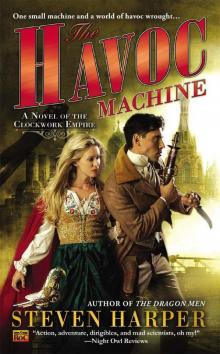 The Havoc Machine
The Havoc Machine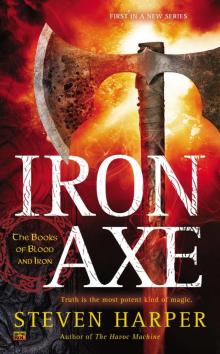 Iron Axe
Iron Axe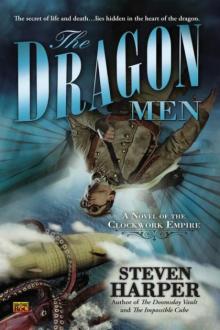 The Dragon Men
The Dragon Men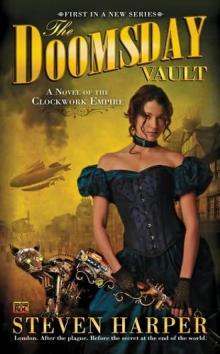 The Doomsday Vault ce-1
The Doomsday Vault ce-1 The Doomsday Vault
The Doomsday Vault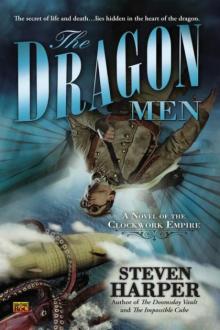 The Dragon Men ce-3
The Dragon Men ce-3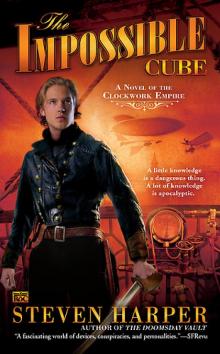 The Impossible Cube
The Impossible Cube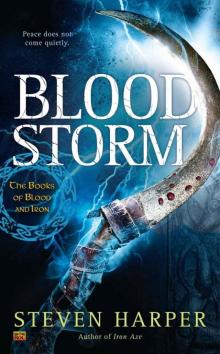 Blood Storm: The Books of Blood and Iron
Blood Storm: The Books of Blood and Iron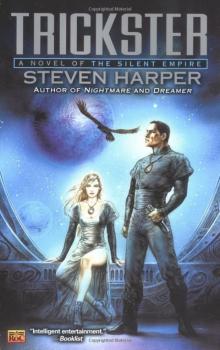 Trickster se-3
Trickster se-3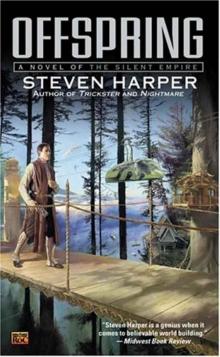 Offspring
Offspring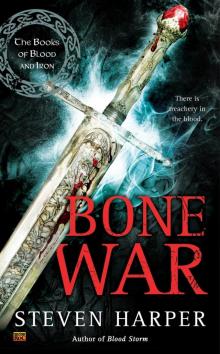 Bone War
Bone War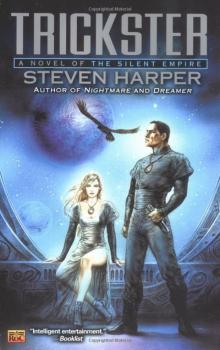 Trickster
Trickster Unity
Unity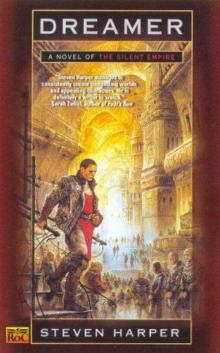 Dreamer
Dreamer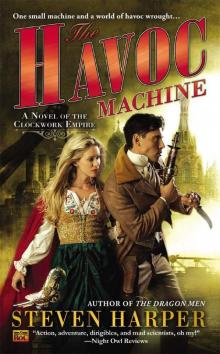 The Havoc Machine ce-4
The Havoc Machine ce-4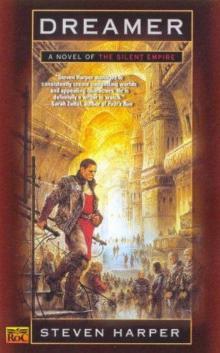 Dreamer se-2
Dreamer se-2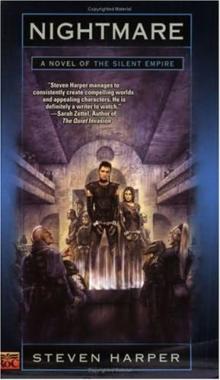 Nightmare se-2
Nightmare se-2